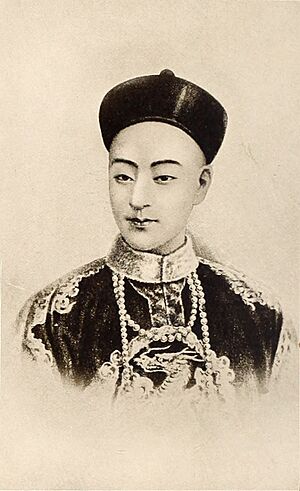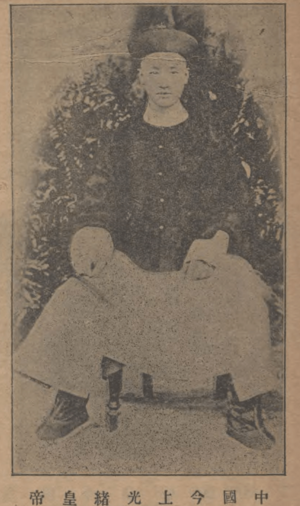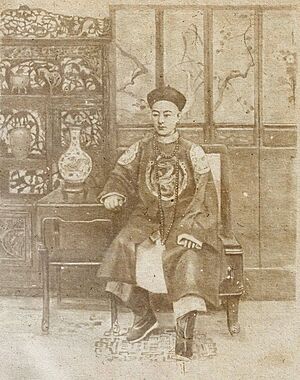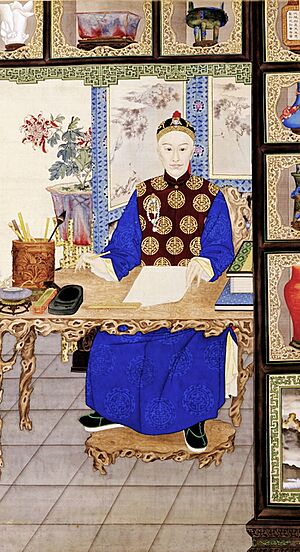Guangxu Emperor facts for kids
Quick facts for kids Guangxu Emperor光緒帝 |
|||||||||||||||||
|---|---|---|---|---|---|---|---|---|---|---|---|---|---|---|---|---|---|
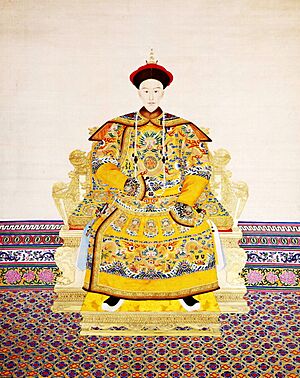 |
|||||||||||||||||
| Emperor of the Qing dynasty | |||||||||||||||||
| Reign | 25 February 1875 – 14 November 1908 | ||||||||||||||||
| Predecessor | Tongzhi Emperor | ||||||||||||||||
| Successor | Xuantong Emperor | ||||||||||||||||
| Regent | Empress Dowager Ci'an (1875–1881) Empress Dowager Cixi (1875–1908) |
||||||||||||||||
| Born | 14 August 1871 (同治十年 六月 二十八日) Prince Chun's Mansion, Beijing |
||||||||||||||||
| Died | 14 November 1908 (aged 37) (光緒三十四年 十月 二十一日) Hanyuan Temple, Yingtai Island, Zhongnan Lakes, Beijing |
||||||||||||||||
| Burial | Chong Mausoleum, Western Qing tombs | ||||||||||||||||
| Consort | |||||||||||||||||
|
|||||||||||||||||
| House | Aisin-Gioro | ||||||||||||||||
| Dynasty | Qing | ||||||||||||||||
| Father | Yixuan, Prince Chunxian of the First Rank | ||||||||||||||||
| Mother | Yehe-Nara Wanzhen | ||||||||||||||||
| Guangxu Emperor | |||||||||||
|---|---|---|---|---|---|---|---|---|---|---|---|
| Traditional Chinese | 光緒帝 | ||||||||||
| Simplified Chinese | 光绪帝 | ||||||||||
|
|||||||||||
The Guangxu Emperor (born Zaitian; 14 August 1871 – 14 November 1908) was a powerful ruler in Chinese history. He was the tenth emperor of the Qing dynasty, which was a very important time for China. He is also known by his temple name, Emperor Dezong of Qing.
Guangxu became emperor when he was very young. His reign was mostly controlled by his aunt, Empress Dowager Cixi. He tried to make big changes to China through something called the Hundred Days' Reform. However, Cixi stopped these changes with a sudden takeover in 1898. After that, he was kept under house arrest until he died.
Guangxu was the second son of Prince Chun, Yixuan. His mother, Yehenara Wanzhen, was the sister of Empress Dowager Cixi. When Emperor Tongzhi died in 1874 without a son, Guangxu was chosen to be the next emperor. He was only three years old at the time.
During his early years, Empress Dowagers Ci'an and Cixi ruled together. After Ci'an died in 1881, Cixi became the only ruler. Guangxu began to rule on his own in 1889. But after his reform efforts failed in 1898, Cixi confined him. He lost all his power and freedom. He died in November 1908 at the age of 38. He ruled for 34 years but had no children.
Guangxu's life was full of challenges. He was not supposed to be emperor but was chosen because the previous emperor had no heir. He faced strict control from Cixi. Even when he grew up, Cixi kept most of the power. During his rule, China faced many problems. These included wars like the First Sino-Japanese War and the Boxer Rebellion. These events caused China to lose land and pay money to other countries.
Seeing China's difficulties, Guangxu worked with smart people to start the Hundred Days' Reform. He wanted to make China stronger and more modern. But conservative groups, led by Cixi, quickly stopped this movement. This led to his confinement and loss of freedom. Despite the challenges, many historians see him as a progressive and forward-thinking emperor.
Contents
Becoming Emperor and His Early Life
The Guangxu Emperor was born Zaitian. His father was Yixuan, Prince Chun, and his mother was Yehenara Wanzhen. She was the younger sister of Empress Dowager Cixi.
On 12 January 1875, Zaitian's cousin, the Tongzhi Emperor, died without a son. This was a problem because the next emperor usually had to be from the next generation. Empress Dowager Cixi chose Zaitian, her nephew, to be the new emperor. The royal family agreed because Zaitian was younger than other possible choices.
Zaitian became the heir to his uncle, the Xianfeng Emperor, not his cousin Tongzhi. This helped keep the tradition of father-son succession. He became emperor at age four and was given the name "Guangxu." This is why he is known as the "Guangxu Emperor."
He was adopted by Empress Dowager Cixi and Empress Dowager Ci'an. Cixi was called "Holy Mother, Empress Dowager." Ci'an was called "Mother Empress, Empress Dowager." They both ruled for him.
Starting in 1876, Guangxu was taught by Weng Tonghe. Weng taught him to respect the Empress Dowagers. In 1881, when Guangxu was nine, Empress Dowager Ci'an died. This left Cixi as the only ruler for the young emperor. Guangxu was very sad about Ci'an's death. During this time, some palace officials tried to take advantage of the young emperor.
Taking Control of the Government
In 1887, the Guangxu Emperor was old enough to rule on his own. However, many officials, including his father Prince Chun, asked Empress Dowager Cixi to keep ruling for a bit longer. Cixi agreed to stay on as regent.
Even so, by 1886, Guangxu started writing his own notes on official reports. In 1887, he took part in his first public farming ceremony. By the end of that year, he began to rule, but still under Cixi's watchful eye.
In February 1889, Guangxu got married as Cixi prepared to retire. Cixi chose her niece, Jingfen, to be the empress. Guangxu did not like this choice. Jingfen became known as Empress Dowager Longyu. Cixi also chose two sisters, Consorts Jin and Zhen, to be his other wives. The next week, after Guangxu was married, Cixi officially retired from ruling.
Years as Emperor
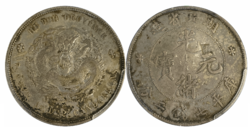
Even after Guangxu started to rule, Empress Dowager Cixi still had a lot of influence. She lived at the Summer Palace for several months each year. But the emperor and his advisors often asked for her advice on important matters. Guangxu would often visit her to discuss state affairs.
In March 1891, Guangxu met with foreign ambassadors in Beijing. This was an important step in China's relations with other countries. That summer, he ordered that Christians in China be protected by the state. This was in response to unrest in some areas.
Guangxu believed in saving money. In 1892, he tried to cut down on spending by the royal household. This was one of his few successes in managing the government's money. But he still had to approve high expenses for Cixi's needs.
In 1894, the First Sino-Japanese War began over control of Korea. Guangxu was eager for the war and thought China would win easily. This was different from Cixi and other officials who wanted a peaceful solution. After China lost major battles, Guangxu wanted to go to the front lines himself. His advisors convinced him not to. He also ordered the execution of generals who lost battles.
After China's defeat and the signing of the Treaty of Shimonoseki, Guangxu reportedly wanted to give up his throne. The treaty made China give up land and pay a lot of money. Many officials wanted to reject the treaty and keep fighting. But eventually, Guangxu had to approve it.
China faced more problems in 1897 when Germany took over Jiaozhou Bay. This led to other foreign powers demanding special rights in China. After this, Guangxu asked officials to suggest ways to reform the military.
The Hundred Days' Reform
After the war and foreign demands, Guangxu believed China needed to learn from countries like Japan. He thought this would make China stronger. In June 1898, he started the Hundred Days' Reform. This was a plan for big changes in politics, laws, and society.
For a short time, Guangxu issued many orders for modernizing reforms. He worked with progressive officials like Kang Youwei. These changes included setting up a modern university in Beijing and building railways. The goal was to make China a modern country, similar to Japan's Meiji Restoration.
However, these reforms were too sudden for China. Many officials who lost their jobs because of the reforms asked Cixi for help. Cixi, who still held real power, decided to stop the reforms. She planned a military takeover. Guangxu learned about this plan and asked his allies to help him. They planned to use the army of Yuan Shikai.
But Yuan Shikai told Cixi about Guangxu's plans. This made Yuan Shikai trusted by Cixi but an enemy of Guangxu. After the plot was revealed, Guangxu was confined to the Yingtai Pavilion. This was a palace on a lake that is now part of Zhongnanhai Compound.
Some historians suggest that Guangxu might have been tricked by the reformists. They believe Cixi stopped the reforms to prevent China from falling under foreign control.
Under House Arrest
After 1898, Guangxu's role as emperor became very limited. He still had the title, but he no longer had real power. He was kept informed about state affairs and was present at official meetings. However, Cixi made all the important decisions. He performed ceremonial duties but never ruled alone again.
In 1898, Guangxu's health started to get worse. Cixi chose Pujun, a son of Guangxu's cousin, to be the next heir. But Pujun and his father were removed from their positions after the Boxer Rebellion. Doctors diagnosed Guangxu with a kidney disease.
During the Boxer Rebellion, Guangxu was against using rebels to fight foreign invaders. In August 1900, Guangxu, Cixi, and other officials fled Beijing. This happened when foreign armies marched into the capital during the Boxer Rebellion.
After returning to Beijing in 1902, Guangxu spent his last years in his palace. He enjoyed working with watches and clocks, a hobby from his childhood. He also read a lot and learned English from Cixi's lady-in-waiting, Yu Deling. His relationship with his wife, Empress Longyu, also improved.
His Death
The Guangxu Emperor died on 14 November 1908, one day before Cixi's death. He was 37 years old. For a long time, people wondered how he died. Many believed that Cixi poisoned him because she feared he would change her policies after she died. Some historians thought Cixi knew she was dying and worried about Guangxu's reforms. Another idea was that Yuan Shikai poisoned him, fearing punishment if Guangxu regained power.
Medical records from Guangxu's doctor showed he had severe stomachaches and his face turned blue. These are signs of arsenic poisoning. To stop rumors, the Qing court said he died of natural causes, but this did not convince everyone.
On 4 November 2008, scientific tests showed very high levels of arsenic in his remains. The amount was 2,000 times higher than normal. Scientists concluded that he was poisoned with a large dose at one time.
Guangxu was succeeded by his nephew, Puyi, who became the Xuantong Emperor. In 1912, Guangxu's wife, Empress Dowager Longyu, signed the order for the emperor to step down. This ended over two thousand years of imperial rule in China. Longyu died childless in 1913.
After the Xinhai Revolution in 1911–1912, the Chinese Republic paid for the building of Guangxu's tomb. His tomb was later robbed during the Chinese Civil War. The burial chamber is now open to visitors.
How He is Remembered
In 1912, Sun Yat-sen praised the Guangxu Emperor. He said Guangxu's education reforms helped China learn about Western culture. After 1949, historian Fan Wenlan called Guangxu "a Manchu noble who could accept Western ideas."
Some historians believe Guangxu was the first Chinese leader to try modernizing reforms and capitalism. His reign saw the lowest point of imperial power in the Qing dynasty. He was also the only Qing emperor to be put under house arrest during his own rule.
Family Life
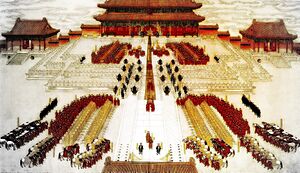
The Guangxu Emperor had one empress and two consorts. Empress Dowager Cixi forced him to marry her niece, Jingfen. Jingfen was two years older than him. Cixi chose her to strengthen her family's power. After their marriage, Jingfen became empress. She was given the title "Longyu" after Guangxu's death.
However, Guangxu did not like his wife. He spent most of his time with his favorite concubine, Consort Zhen. Like the emperor before him, Guangxu died without having any children. After his death in 1908, Empress Dowager Longyu ruled together with Zaifeng.
Empress
- Empress Xiaodingjing (孝定景皇后) of the Yehe-Nara clan (葉赫那拉氏; 28 January 1868 – 22 February 1913), personal name Jingfen (靜芬)
Imperial Noble Consort
- Imperial Noble Consort Wenjing (溫靖皇貴妃) of the Tatara clan (他他拉氏; 6 October 1873 – 24 September 1924)
- Imperial Noble Consort Keshun (恪順皇貴妃) of the Tatara clan (他他拉氏; 27 February 1876 – 15 August 1900)
See also
 In Spanish: Guangxu para niños
In Spanish: Guangxu para niños
- Family tree of Chinese monarchs (late)
- First Sino-Japanese War
- Boxer Rebellion
 | Tommie Smith |
 | Simone Manuel |
 | Shani Davis |
 | Simone Biles |
 | Alice Coachman |


